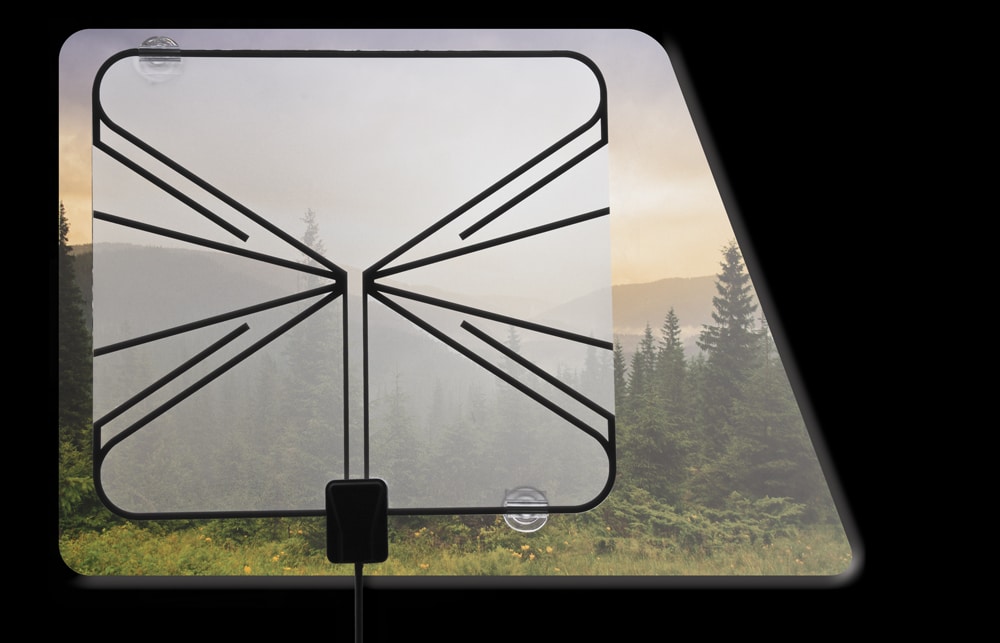At the risk of dating myself, I remember jury-rigging a rabbit-ear antenna to a portable TV that we tried to use while RVing. After painful maneuvering, we were able to pull in a few over-the-air channels, but dealing with a snowy picture was part of the experience. Broadcast TV has taken a back seat to cable and satellite service, but the digital transformation has made major networks and a host of other independent channels readily available in HD clarity — for free — in most geographical markets.

The Rayzar antenna attaches to a window via suction cups. For better reception, avoid metal window frames.
Winegard introduced the Rayzar high VHF and UHF antenna with a new twist on “rabbit ears.” Actually, the Rayzar has no resemblance to the rabbit ear antenna, but it’s the first one that can be used indoors that actually works.
Made of thin translucent plastic, the 13-by-12-inch antenna is designed for mounting in a window. While the antenna is multidirectional, users will find there are preferred locations for better reception. Suction cups that clip to the antenna are used to secure the thin plastic to the window. It’s best to avoid metal window frames for better reception. The antenna is not designed for outside use.
Once the antenna is in place, the attached 15-foot mini cable is routed to the coax fitting in back of the TV. This is the connection that is typically used when hooking up to cable. Winegard offers a female-to-female barrel connector (FS-8100) to attach additional cable if needed to reach the intended TV.
The Rayzar is designed to pull in signals that are within a 25-to-30-mile range. Unless you’re way out in the boonies, most towns and cities are within range to pick up at least a few channels. Users can go online at www.dtv.gov/maps and put in a zip code to find out which channels are within range. Not only will the channels be listed, but also the signal strength icons will give the user an idea of what to expect.
Once the antenna is in place and connected to the TV, the last step is to run a channel scan to locate and program available channels. This must be done every time the antenna is moved or the TV is disconnected from the antenna.
For some owners, this antenna could be redundant equipment, but for those who travel in older rigs with rooftop batwing antennas that are not suitable for digital reception, the Rayzar is a good replacement. It’s also useful for those who have no antenna or one that has been damaged over the years. The Rayzar is only compatible with digital tuners — those used in all TVs manufactured after March 1, 2007.
We field-tested the Rayzar in an area the aforementioned website listed as having only a few channels within reach. Once the antenna was placed on a side window, we were able to tune in more than 30 channels, with good clarity and audio. We pulled in all the networks along with many independent channels, which were broadcast in HD. Obviously, the website needs updating.
I personally opted out of a rooftop antenna because I rely on satellite TV. But over time I missed receiving local channels, which present the news and weather in the areas we’re visiting. And when the trees and buildings restrict the view to the satellites, I’m glad I’ve tucked the Rayzar into a storage compartment.
The Rayzar retails for $49.99, but can be found online and at Camping World for $39.99 on sale most of the time.
Winegard
800-288-8094, www.winegard.com






